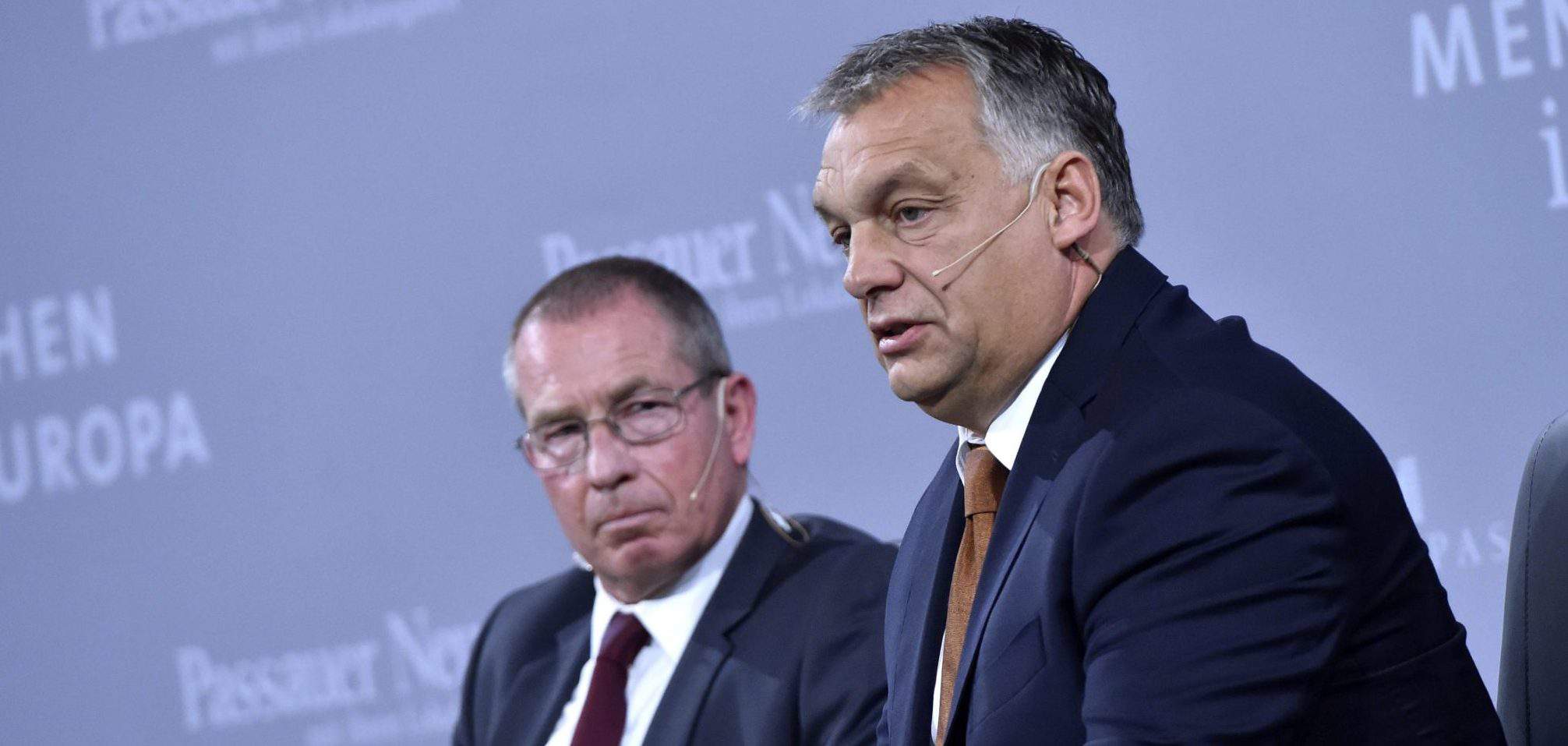Hungary, Germany natural allies, says Orbán in Passau – UPDATE
Passau, 2017. október 24. Orbán Viktor miniszterelnök (j) a Passauer Neue Presse napilap Európa-szkepszis - miért van szükségünk Európára? címû pódiumbeszélgetésén Passauban 2017. október 24-én. Mellette a beszélgetés moderátora, Thomas Baumann, az ARD német közszolgálati televízió berlini stúdiójának vezetõje. MTI Fotó: Máthé Zoltán
Hungary and Germany are natural allies and should remain as such in the future, too, Prime Minister Viktor Orbán said in Passau on Tuesday. Orbán was speaking in part of a podium discussion on Euroscepticism.
The prime minister visited the tomb of Gisela of Hungary, the country’s first queen consort, in the Kloster Niedernburg.
In a speech by the tomb, Orbán said that since “Hungarian history is clouded, anything we know about it is especially valuable”. One such fact is that King St. Stephen of Hungary chose a wife from Bavaria, Orbán said.
Back then, St. Stephen did not know “how big a help this would be for us”, Orbán said.
“Because now when we have to respond to the malicious criticisms that doubt our commitment to European values, it is enough for us to point to Gisela and all criticisms are silenced,” he added.
After the death of Hungary’s first king, the country descended into a dark period of civil war and it was doubtful whether Hungary could stay committed to Christianity, Orbán said. But the legacy of Gisela and St. Stephen was so strong, their prestige so high, that Hungary managed to consolidate the situation, he said.
Orbán calls for preserving Europe’s achievements
Speaking as part of a podium discussion on Euroscepticism organised by the daily Passauer Neue Presse, Orbán mentioned former German chancellor Helmut Kohl’s dream of German reunification, the Schengen system and the free movement of labour as examples of the achievements the continent must preserve.
“Europe’s success is important to Hungary because we Hungarians protected Europe’s eastern borders for centuries,” Orbán said.
“We shed a lot of blood for the continent.”
But Hungary also knew that the Communists could only be overthrown and the Soviets could only be driven out if there was a united European will to do so, he said.
“In other words, Hungarian freedom and independence and Europe’s reunification are the same story,” the prime minister said.
On the topic of illegal migration, Orbán said that
a country could not be forced to take in new people groups if its citizens are opposed to it.
It must be accepted that Hungarians do not want to take in peoples who are different from them, he said.
Orbán said it was his job to enforce the will of the Hungarian people, arguing that this was the essence of democracy.
He said that tens of millions of people were expected to leave their homelands in the future.
“The question is how we view this process,” Orbán said. “Do we surrender ourselves to it or do we want to stop it?”
Orbán said that with the exception of Europe, every region gave the same answer to this question.
While the United States, Australia, China, Russia and the Persian Gulf countries all maintain strict controls on their borders, “Europe opens up its borders,” he insisted.
Every European country has the right to decide how it wants to face this challenge and Hungarians say they want to protect their borders, Orbán said.
The prime minister said Hungary would not accept any legal regulation that seeks to derive Hungary of its sovereign right to decide who can live in the country.
Orbán said there was a draft asylum reform before the European Union that would implement a permanent migrant distribution scheme with no upper limit.
The reason why Hungary had not agreed to taking in 1,200 migrants before was because it knew that this was a “Trojan horse” and “if we allowed someone else to determine who can live in Hungary once, we could not have taken back this right at a later point,” Orban said.
Asked about the activities of US financier George Soros, Orbán said that the billionaire is associated with a “huge international civil group network”. “And while we were fighting to protect the border, these organisations attacked soldiers and aided the illegal migrants. They helped them cross the border illegally,” he said. “All of this is unacceptable,” Orbán said.
Speaking about the Visegrad Group, Orbán said that the alliance comprising Poland, the Czech Republic, Slovakia and Hungary “isn’t a problem but an asset for the EU which contributes greatly to its success”. The V4 “are doing very well, thank you”, he insisted. The group consists of four successful European countries cooperating closely, he said. Had they been admitted to the EU “in time”, at the end of the 1990s instead of 2004, the global economic crisis would have taken a very different course, he said. If the group were to be separated from the bloc by institutions operating independently from the V4, “the greatest loser of that process would be Germany”, Orbán said. Germany would be “left alone with financially strapped countries looking to it for help”, Orbán insisted. Europe should have both Germany and the Visegrad group countries in its centre, he said. “We are working on this, quite successfully, if we look at the numbers”, he said.
On another subject, Orbán said that the antidote for populism was success. If non-populists are successful, there is no room left for populism, he said.
He said the reason for why populists were not successful in Hungary was GDP growth, wage growth, falling unemployment and security.
Hungary is a democratic country, Orbán said, adding that if the people want something done, it was the government’s job to get it done. If the people do not want migrants, it is the government’s job to protect the borders, he said.
“If we want a democracy, the leaders must heed the will of the people,” Orbán said.
As we wrote yesterday: “If freedom and national independence are lost, then so are we,” Prime Minister Viktor Orbán said at a state commemoration of Hungary’s anti-Soviet uprising of 1956 in front of Budapest’s House of Terror Museum on Monday.
Photo: MTI
Source: MTI
please make a donation here
Hot news
What happened today in Hungary – 26 July, 2024
Drama: number of births in a 20-year low in Hungary
Yay or nay? – 6 odd Hungarian delicacies that make our skin crawl
Budapest tourism “exploded” this past weekend
Container transport in Budapest may stop: How will this affect Hungarian economy?
Minister: Hungary will protect its territory by every means possible






1 Comment
Well done Mr. Orbán! Congratulations from a supporter in Holland. Now finally something will be changed, also in Germany, because of the mutiny in the CDU: Merkel must leave. Browsing through the media and looking at TV newsprograms last week something happened you hardly expect in this ‘Ordungsliebende’ country. The youth section of the CDU Düsseldorf has called on Mufti Merkel to step down and withdraw. ‘Wir wollen den totalen Kadavergehorsam nicht länger’ headlined the Rheinische Post and with this title exactly what was indicated had to be done in the Netherlands long time ago. Young people are tired of the destructive politics of the Trutte I, II and III cabinets and who understand that political leaders who live too long together in their own, imagined world of life. On TV, but also the newspaper ‘die Welt’, CDU youth chairman of the department Düsseldorf, Ulrich Wensel, indicated that he and his fellow party members think it is high time that Merkel should no longer be a candidate for the CDU/CSU if new elections would be arranged. Incidentally, almost 100,000 readers of ‘die Welt’ participated and 81% of them agreed with Wensel. The argument that there would not be a suitable successor to Merkel was rejected by Wensel by putting some of the politicians seen as good candidates by him and his fellow party members since he did not think he would choose a sort of ‘demigod’ like Merkel herself but they want men like David McAllister, Jens Spahn, Carsten Linnemann, Paul Ziemiak to be a good alternative. Now it would take us too far to deepen this choice at this moment, but as indicated, what would it be refreshing if young people in the Netherlands whose future is largely determined by politics would also agree interest and commitment.
A vain dream? Yes!
But in the meantime a half-baked alternative is approaching, about which was already written after the results of the German elections became known. Would there be a GroKo, a grosse Koalition, a coalition between the minimized SPD and the CDU/CSU? Insiders thought this was impossible, especially the captain of the SPD, Herr Martin Schulz, the EU parliamentary chairman who had been ousted from Brussels, already stated that his party had been appointed by the electorate to start opposition. But also in Germany it attracts ‘plush’ and it is now so far that on 30.11.2017 both Merkel and Schulz will visit the German president Steinmeier (SPD) at the same time. In that conversation it will be considered whether the ‘GroKo’ should come anyway to prevent new elections being held in Germany, where the CDU, Merkel, will again fall in the favor of the voters and the AfD could rise again, a nightmare for the existing political elite, just like in the Netherlands the profit from the PVV.
The youth department of the SPD has already informed Schulz that it does not want to agree with a GroKo, which might lead to an internal vote on this charged subject, but will not bring the Berlin puppets to a different mind in the end. Because even in Berlin, just like elsewhere, you do not know who will eventually pull the strings behind the people behind them.